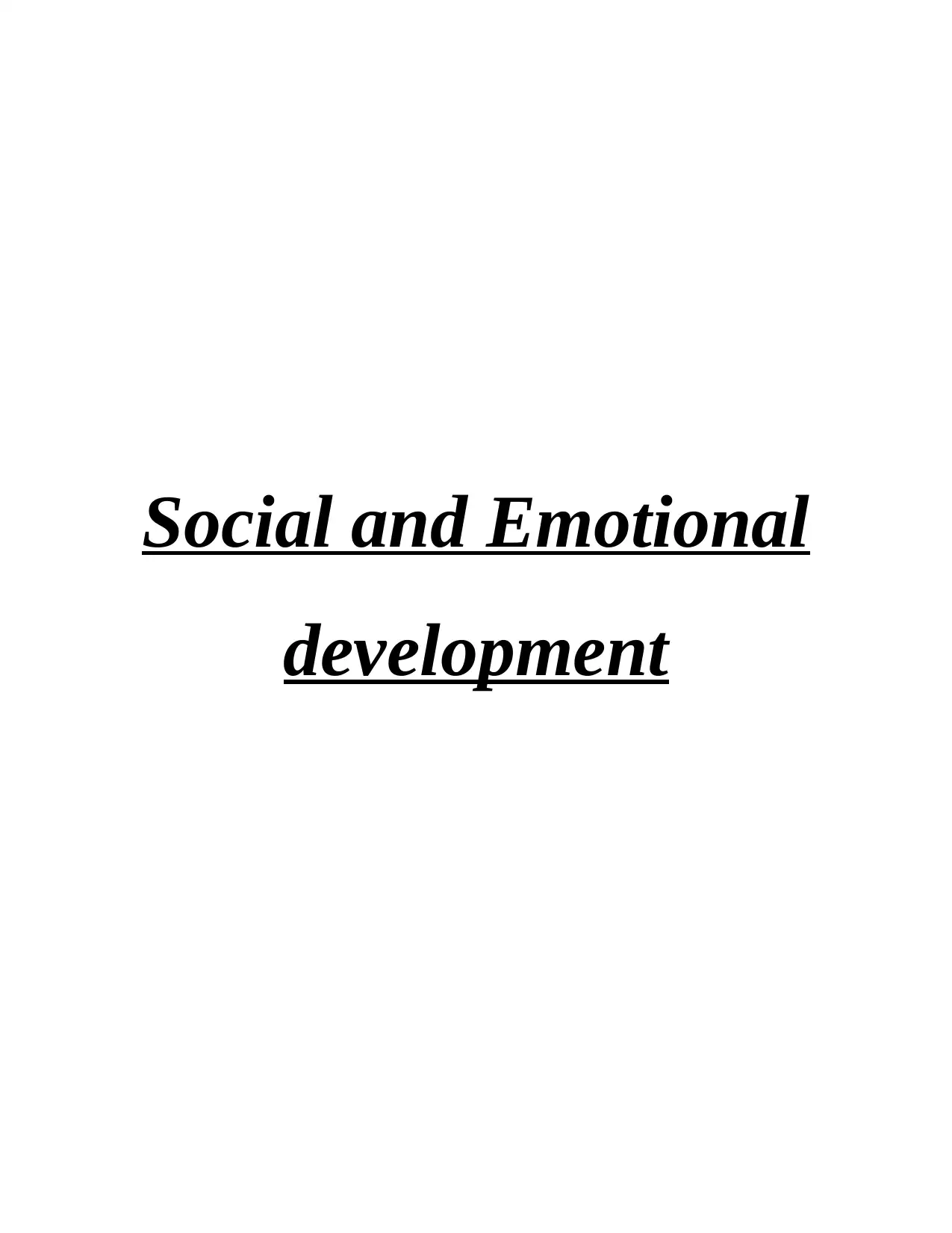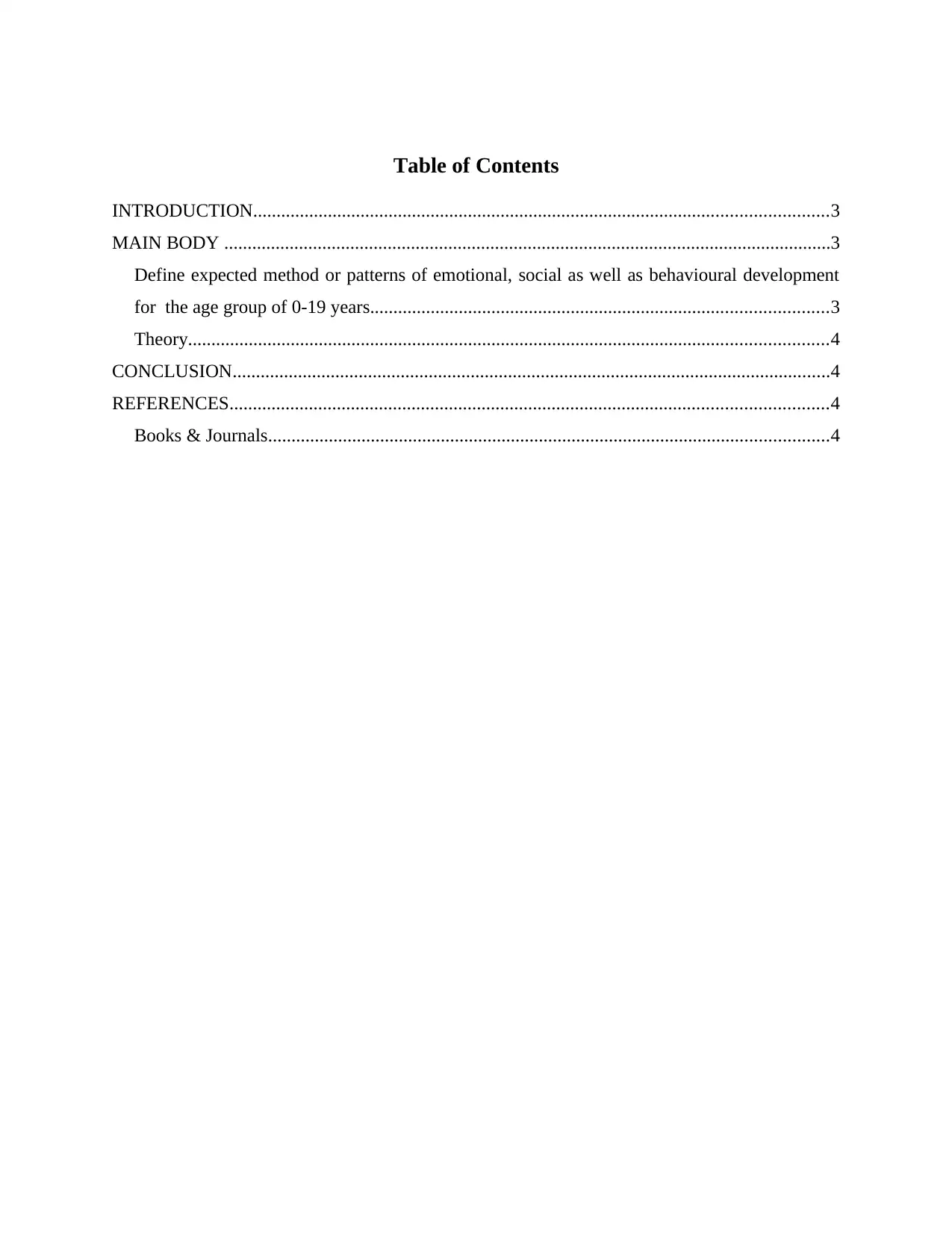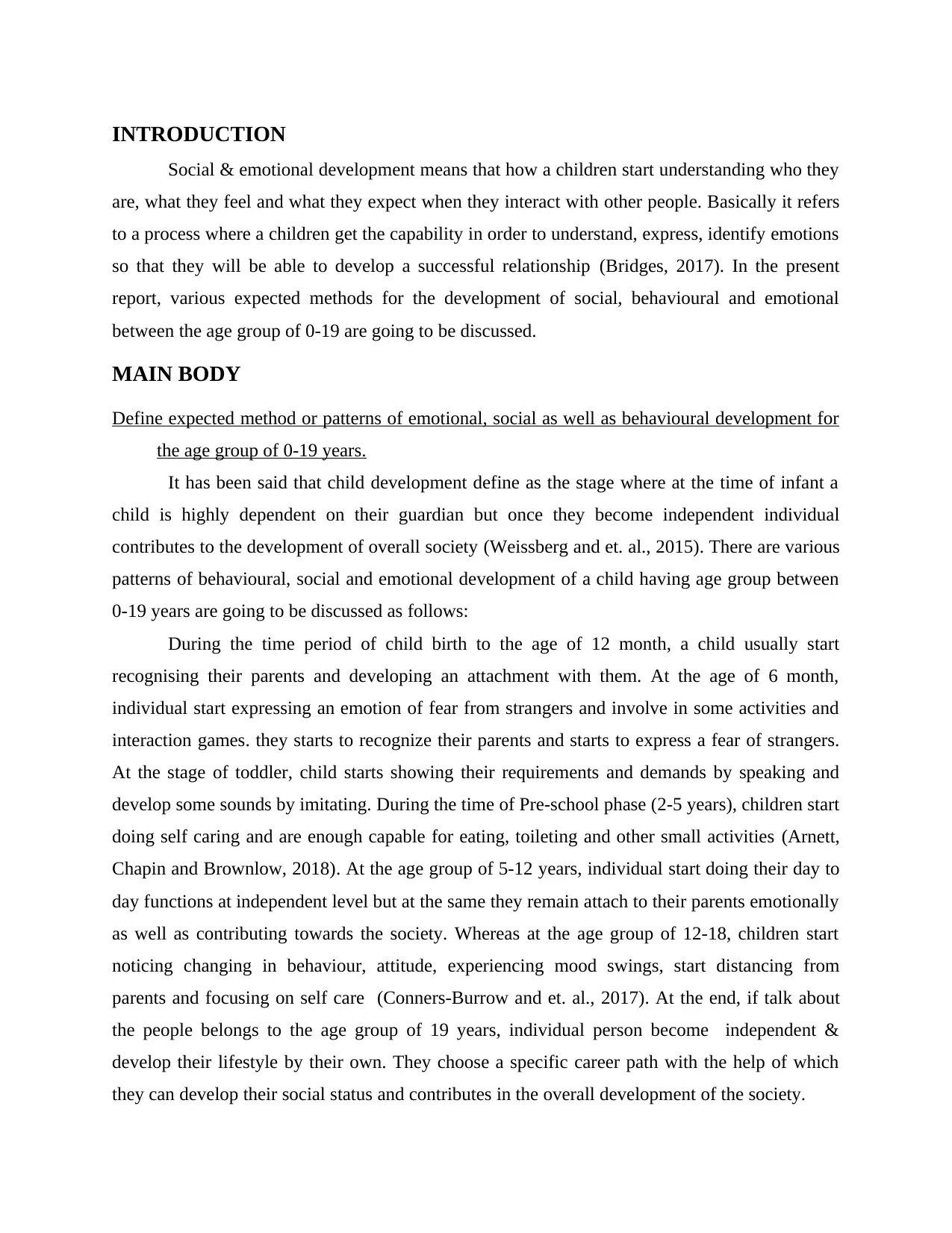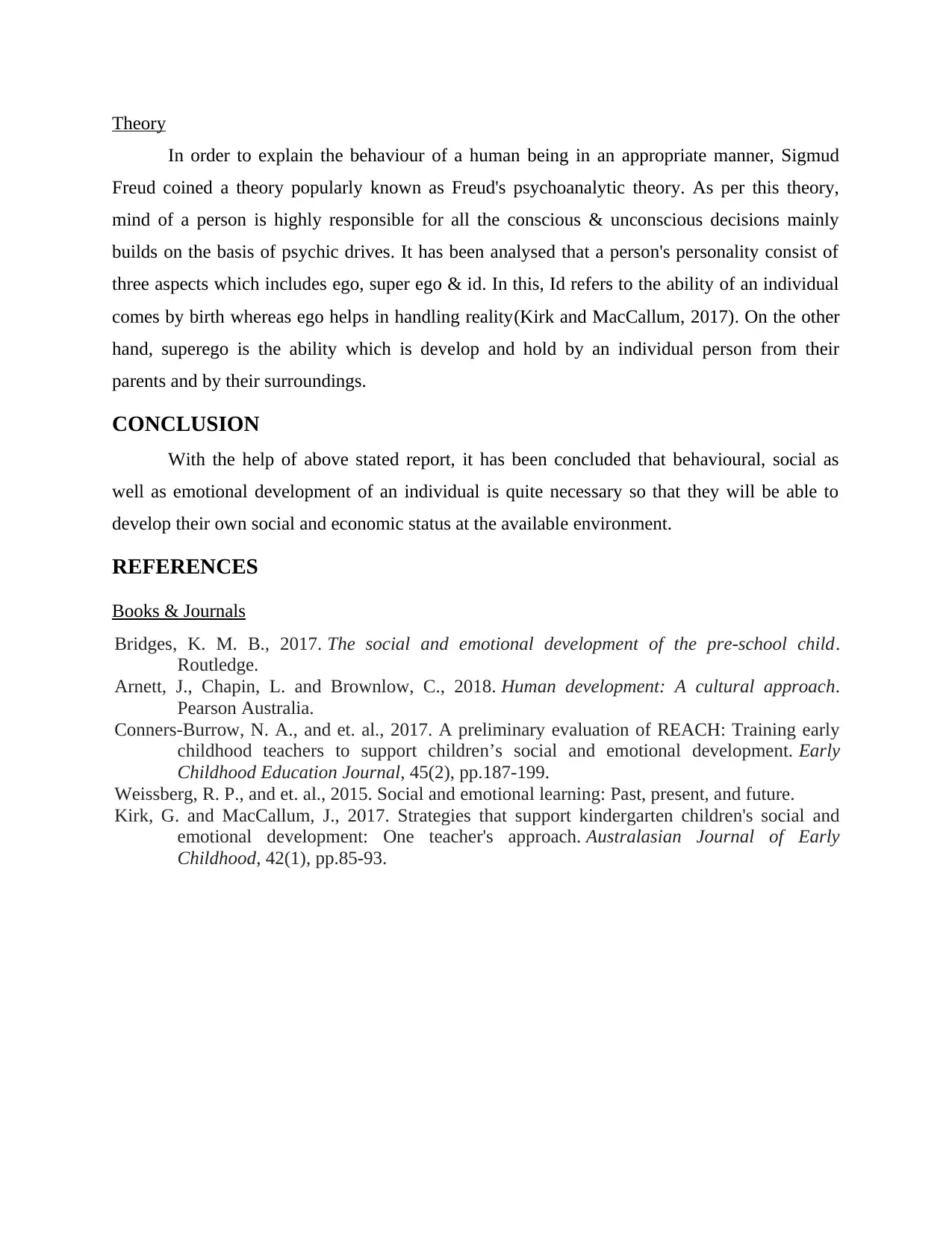Comprehensive Report: Social and Emotional Development (0-19 years)
VerifiedAdded on 2023/01/16
|4
|846
|83
Report
AI Summary
This report delves into the expected methods and patterns of emotional, social, and behavioral development in individuals aged 0-19 years. It explores the progression of these aspects from infancy through adolescence, detailing key milestones and changes at different age groups. The report discusses the development of attachment, emotional expression, self-care abilities, and the transition towards independence and social contribution. Furthermore, it presents Sigmund Freud's psychoanalytic theory, highlighting the roles of the id, ego, and superego in shaping personality and behavior. The conclusion emphasizes the importance of these developmental processes for establishing social and economic status. The report also includes references to relevant books and journals.

Social and Emotional
development
development
Paraphrase This Document
Need a fresh take? Get an instant paraphrase of this document with our AI Paraphraser

Table of Contents
INTRODUCTION...........................................................................................................................3
MAIN BODY ..................................................................................................................................3
Define expected method or patterns of emotional, social as well as behavioural development
for the age group of 0-19 years..................................................................................................3
Theory.........................................................................................................................................4
CONCLUSION................................................................................................................................4
REFERENCES................................................................................................................................4
Books & Journals........................................................................................................................4
INTRODUCTION...........................................................................................................................3
MAIN BODY ..................................................................................................................................3
Define expected method or patterns of emotional, social as well as behavioural development
for the age group of 0-19 years..................................................................................................3
Theory.........................................................................................................................................4
CONCLUSION................................................................................................................................4
REFERENCES................................................................................................................................4
Books & Journals........................................................................................................................4

INTRODUCTION
Social & emotional development means that how a children start understanding who they
are, what they feel and what they expect when they interact with other people. Basically it refers
to a process where a children get the capability in order to understand, express, identify emotions
so that they will be able to develop a successful relationship (Bridges, 2017). In the present
report, various expected methods for the development of social, behavioural and emotional
between the age group of 0-19 are going to be discussed.
MAIN BODY
Define expected method or patterns of emotional, social as well as behavioural development for
the age group of 0-19 years.
It has been said that child development define as the stage where at the time of infant a
child is highly dependent on their guardian but once they become independent individual
contributes to the development of overall society (Weissberg and et. al., 2015). There are various
patterns of behavioural, social and emotional development of a child having age group between
0-19 years are going to be discussed as follows:
During the time period of child birth to the age of 12 month, a child usually start
recognising their parents and developing an attachment with them. At the age of 6 month,
individual start expressing an emotion of fear from strangers and involve in some activities and
interaction games. they starts to recognize their parents and starts to express a fear of strangers.
At the stage of toddler, child starts showing their requirements and demands by speaking and
develop some sounds by imitating. During the time of Pre-school phase (2-5 years), children start
doing self caring and are enough capable for eating, toileting and other small activities (Arnett,
Chapin and Brownlow, 2018). At the age group of 5-12 years, individual start doing their day to
day functions at independent level but at the same they remain attach to their parents emotionally
as well as contributing towards the society. Whereas at the age group of 12-18, children start
noticing changing in behaviour, attitude, experiencing mood swings, start distancing from
parents and focusing on self care (Conners-Burrow and et. al., 2017). At the end, if talk about
the people belongs to the age group of 19 years, individual person become independent &
develop their lifestyle by their own. They choose a specific career path with the help of which
they can develop their social status and contributes in the overall development of the society.
Social & emotional development means that how a children start understanding who they
are, what they feel and what they expect when they interact with other people. Basically it refers
to a process where a children get the capability in order to understand, express, identify emotions
so that they will be able to develop a successful relationship (Bridges, 2017). In the present
report, various expected methods for the development of social, behavioural and emotional
between the age group of 0-19 are going to be discussed.
MAIN BODY
Define expected method or patterns of emotional, social as well as behavioural development for
the age group of 0-19 years.
It has been said that child development define as the stage where at the time of infant a
child is highly dependent on their guardian but once they become independent individual
contributes to the development of overall society (Weissberg and et. al., 2015). There are various
patterns of behavioural, social and emotional development of a child having age group between
0-19 years are going to be discussed as follows:
During the time period of child birth to the age of 12 month, a child usually start
recognising their parents and developing an attachment with them. At the age of 6 month,
individual start expressing an emotion of fear from strangers and involve in some activities and
interaction games. they starts to recognize their parents and starts to express a fear of strangers.
At the stage of toddler, child starts showing their requirements and demands by speaking and
develop some sounds by imitating. During the time of Pre-school phase (2-5 years), children start
doing self caring and are enough capable for eating, toileting and other small activities (Arnett,
Chapin and Brownlow, 2018). At the age group of 5-12 years, individual start doing their day to
day functions at independent level but at the same they remain attach to their parents emotionally
as well as contributing towards the society. Whereas at the age group of 12-18, children start
noticing changing in behaviour, attitude, experiencing mood swings, start distancing from
parents and focusing on self care (Conners-Burrow and et. al., 2017). At the end, if talk about
the people belongs to the age group of 19 years, individual person become independent &
develop their lifestyle by their own. They choose a specific career path with the help of which
they can develop their social status and contributes in the overall development of the society.
⊘ This is a preview!⊘
Do you want full access?
Subscribe today to unlock all pages.

Trusted by 1+ million students worldwide

Theory
In order to explain the behaviour of a human being in an appropriate manner, Sigmud
Freud coined a theory popularly known as Freud's psychoanalytic theory. As per this theory,
mind of a person is highly responsible for all the conscious & unconscious decisions mainly
builds on the basis of psychic drives. It has been analysed that a person's personality consist of
three aspects which includes ego, super ego & id. In this, Id refers to the ability of an individual
comes by birth whereas ego helps in handling reality(Kirk and MacCallum, 2017). On the other
hand, superego is the ability which is develop and hold by an individual person from their
parents and by their surroundings.
CONCLUSION
With the help of above stated report, it has been concluded that behavioural, social as
well as emotional development of an individual is quite necessary so that they will be able to
develop their own social and economic status at the available environment.
REFERENCES
Books & Journals
Bridges, K. M. B., 2017. The social and emotional development of the pre-school child.
Routledge.
Arnett, J., Chapin, L. and Brownlow, C., 2018. Human development: A cultural approach.
Pearson Australia.
Conners-Burrow, N. A., and et. al., 2017. A preliminary evaluation of REACH: Training early
childhood teachers to support children’s social and emotional development. Early
Childhood Education Journal, 45(2), pp.187-199.
Weissberg, R. P., and et. al., 2015. Social and emotional learning: Past, present, and future.
Kirk, G. and MacCallum, J., 2017. Strategies that support kindergarten children's social and
emotional development: One teacher's approach. Australasian Journal of Early
Childhood, 42(1), pp.85-93.
In order to explain the behaviour of a human being in an appropriate manner, Sigmud
Freud coined a theory popularly known as Freud's psychoanalytic theory. As per this theory,
mind of a person is highly responsible for all the conscious & unconscious decisions mainly
builds on the basis of psychic drives. It has been analysed that a person's personality consist of
three aspects which includes ego, super ego & id. In this, Id refers to the ability of an individual
comes by birth whereas ego helps in handling reality(Kirk and MacCallum, 2017). On the other
hand, superego is the ability which is develop and hold by an individual person from their
parents and by their surroundings.
CONCLUSION
With the help of above stated report, it has been concluded that behavioural, social as
well as emotional development of an individual is quite necessary so that they will be able to
develop their own social and economic status at the available environment.
REFERENCES
Books & Journals
Bridges, K. M. B., 2017. The social and emotional development of the pre-school child.
Routledge.
Arnett, J., Chapin, L. and Brownlow, C., 2018. Human development: A cultural approach.
Pearson Australia.
Conners-Burrow, N. A., and et. al., 2017. A preliminary evaluation of REACH: Training early
childhood teachers to support children’s social and emotional development. Early
Childhood Education Journal, 45(2), pp.187-199.
Weissberg, R. P., and et. al., 2015. Social and emotional learning: Past, present, and future.
Kirk, G. and MacCallum, J., 2017. Strategies that support kindergarten children's social and
emotional development: One teacher's approach. Australasian Journal of Early
Childhood, 42(1), pp.85-93.
1 out of 4
Related Documents
Your All-in-One AI-Powered Toolkit for Academic Success.
+13062052269
info@desklib.com
Available 24*7 on WhatsApp / Email
![[object Object]](/_next/static/media/star-bottom.7253800d.svg)
Unlock your academic potential
Copyright © 2020–2026 A2Z Services. All Rights Reserved. Developed and managed by ZUCOL.





